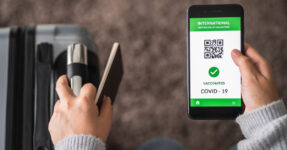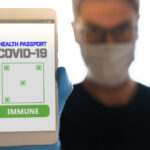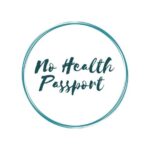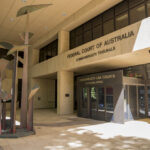COVID Passports On The Way for Australia

The Federal Cabinet has backed a proposal for vaccination certificates – or ‘vaccination passports’ – for all international travel.
The ‘vaccine passport’ proposal was mooted for some time, but has been presented once again this week.
The Federal Government says it is part of ‘phase four’ of its plan to re-open international borders.
The certificates will act like QR codes and be linked to MyGov accounts. They could either be printed out or put into a digital wallet on an electronic device.
The Federal Government says it aims to use technology promoted by the International Civil Aviation Organisation, which is called a Visible Digital Seal.
This would be aided by a deal that has been reached with Apple and Google to allow digital wallets on both iPhone and Android devices.
Vaccine required for International travel
Most Australians foreshadowed that Covid vaccinations would ultimately be required for international travel.
And irrespective of the Government’s plan, Qantas has confirmed it is rolling out digital health passes for international flights, which will confirm that passengers have Covid clearance to fly.
Overseas
Many countries, including Britain, the United States and Canada now require proof of vaccination or a negative test result in order for people to avoid 14-day quarantine on arrival. Britain has pushed ahead with plans to extend the requirement of a vaccine certificate to attend to large-scale events.
Both Houses of the French Parliament have passed controversial legislation making a vaccine certificate mandatory for entry into certain restaurants, cafes, bars, shopping malls and cinemas. Breaking these laws attracts a maximum penalty of 6-month prison term and a €10,000 ($16,000AUD) fine.
And business owners who fail to check the status of patrons face a 1 year prison sentence and a €45,000 (about $72,000 AUD) fine.
So, for anyone wanting to travel internationally in the future, the vaccine is likely to be a requirement to both enter and stay in many countries.
Increasing pressure for Australians get vaccinated
Here at home, Prime Minister Scott Morrison has supported a proposal to make vaccination certificates a requirement of domestic travel too, saying it would encourage more people to get vaccinated sooner.
Mr Morrison keeps suggesting that he wants 80% of Australians vaccinated. The contradiction is that the Government has said vaccination will always be ‘optional’, yet the rules are likely to make it almost impossible for anyone who wants to live a ‘normal’ life to do so without receiving a vaccination.
And of course, the Federal Government has been heavily criticised for harping on about increasing vaccination levels while performing woefully in terms of having vaccines available for all.
Democracy – a casualty of the pandemic
There are very serious concerns that the practical requirement to vaccinate is a slippery slope for democracy and human rights, in particular personal freedoms.
The Cabinet is divided on the issue, with opponents of the it unjustly discriminates against Australians who choose not to receive a relatively-new drug injected into their bodies.
There are other issues that need to be carefully considered under the current Australian plan too, including the the dangers of collecting and sharing personal health information. The My Health Record data breaches are an example of the dangers in that regard.
The Department of Foreign Affairs and Trade issues passports and it has no legal basis for collecting Australians’ vaccination status under the Australian Passports Act, which may mean the data has to be stored by other government agencies.
The vaccine certificates are being developed by Services Australia and the Department of Foreign Affairs and Trade, but will also link with a new technology being developed by the Department of Home Affairs called the Digital Passenger Declaration, which will allow for the collection of health information. The government is still trying to work out how to link the three services.
With a rollout deadline set for October-November later this year, any new legislation or amendments to existing laws would need to be rushed through Parliament, potentially avoiding detailed scrutiny and robust debate.
Counterfeit certificates
There is also the issue of cyber-security. Overseas, the black market trade in counterfeit Covid certificates has been emerging for some time and is beginning to thrive, with Europol issuing a warning earlier this year that fraudsters had been caught selling counterfeit documents in the UK for up to $200.
South Australian Senator Rex Patrick told the media this week that the current Australian system is flawed and that he was able to forge a COVID-19 vaccination certificate in just 15 minutes. The Federal Government is adamant that the use of QR codes, which there have already been warnings about, will solve the issue.
It has to be noted though, that over the past several years, the Australian Government has suffered a number of cyber attacks on its systems and cyber-security experts have long warned of a skills shortage in the country, which ultimately puts personal data at risk.
However, the erosion of personal freedoms, personal privacy and ultimately, democracy don’t seem to be top of mind right now as our politicians increasingly vote for limiting people’s freedoms and increasing surveillance as a way out of the pandemic crisis.







